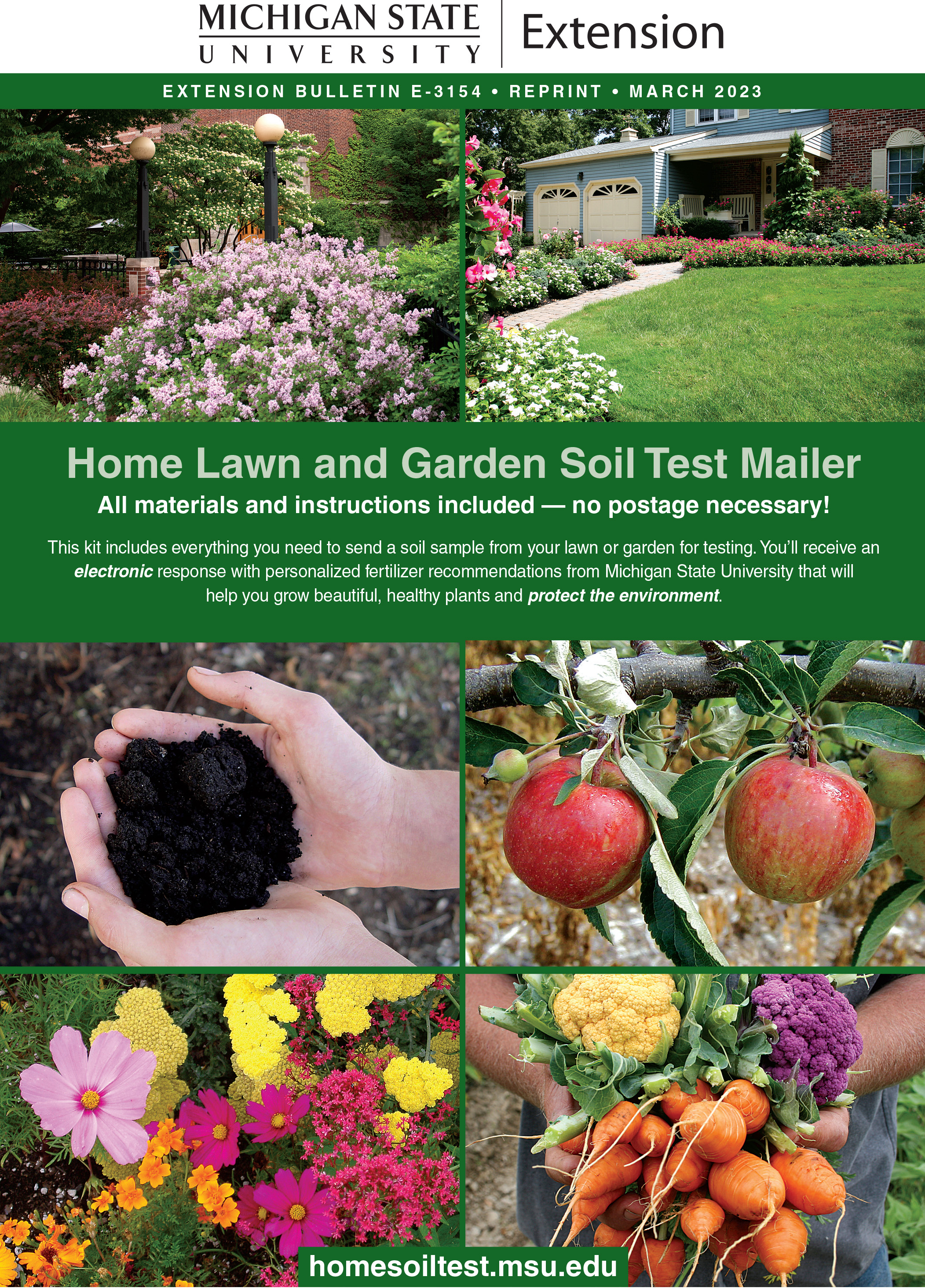
Smart Gardening: Don’t Guess - Soil Test!
DOWNLOADDecember 22, 2023 - Rebecca Finneran, Michigan State University Extension
Plant scientists know that lawn and garden plants require 18 nutrients for healthy, productive growth. Your lawn and garden “soil environment” is a reservoir that houses these nutrients, providing the platform
for plant roots to acquire them. Understanding each individual plant’s needs and the type of soil you have is the first step in properly managing soil fertility.
Often our lawn and garden soils are rich and productive, needing little or no enhancements. Others may be
poor soils or depleted, needing to be replenished. Approaching plant care without conducting a baseline soil test may put gardeners at the risk of over fertilization. This can have negative effects on plant growth as well as creating nutrient imbalances in the soil.
Michigan State University Extension provides an easy- to-use soil test kit (homesoiltest.msu.edu) that can be purchased online from the MSU Extension Bookstore (https://shop.msu.edu/products/bulletin-e3154) or from your local county MSU Extension office.

The Home Lawn and Garden Soil Test Mailer can be used to process any type of home soil sample, such as lawn, vegetable garden, tree, shrub, flower, and fruit. Based on your soil test results, you will receive a custom fertilization program to meet the needs of your plants and safeguard the environment. The cost of this mailer includes shipping to the lab, results, and interpretation. For purchase at your local MSU Extension county office, please call ahead to check availability and office hours.
Why should I soil test?
- Know your soil. Soil testing is an important diagnostic tool to evaluate nutrient imbalances and understand plant growth.
- Understand. The most important reason to soil test is to have a basis for intelligent application of fertilizer and lime.
- pH. Testing allows homeowners to adjust soil pH to the optimum range (6.0-7.0), which makes nutrients more available for plant growth.
- Protection of our environment. Avoid contaminants that can enter our surface and ground waters by over-application of phosphorous or nitrogen fertilizers.
- Cost savings. Why apply what you don’t need? Soil test results provide information about the soil’s ability to supply nutrients to plants for adequate growth and are the basis of deciding how much lime and fertilizer are needed.
What will I find out from my soil sample?
Home Lawn and Garden Soil Test Mailer results will determine your soil pH, level of organic matter, and provide you with a reading for nutrients including phosphorus, potassium, calcium and magnesium. The results will also provide a recommendation for nitrogen and will determine how much lime should be applied based upon the type of plant you specify.
How long before I receive my test results?
You should receive test results in about two weeks. The lab analysis takes three to five working days from the time samples are received. Remember, MSU recommendations are in pounds of nutrient needed, not pounds of fertilizer to be applied!
Your results will also include an area calculator that helps you determine how many square feet you need to apply fertilizer.

How do I take a soil sample?
- Determine which one lawn or garden area you would like to test. Don’t combine these soils.
- Using a spade or trowel, collect 10 random soil samples from the area and place in a clean pail.
- Each sample should be a slice of soil as deep as the plant roots go (3 to 4 inches deep for lawn; 7 inches deep for gardens and all other plants).
- Remove plant debris, roots and thatch from the sample.
- Combine the 10 random samples in the pail, mix thoroughly and remove approximately 1 cup of mixed soil. If the soil is wet, spread it on paper and allow it to air dry overnight before filling the sample bag. Do not use artificial heat as it will skew test results.
- Fill the re-closable plastic bag included in the Soil Test Mailer with your dry soil and seal carefully.
- Place bag inside the white, postage-paid envelope and put in your mailbox for pick up.
For more information on a wide variety of Smart Gardening topics, visit www.migarden.msu.edu or call MSU’s Lawn and Garden hotline at 1-888-678-3464.
This work is supported by the Crop Protection and Pest Management Program [grant no 2021-70006-35450] from the USDA National Institute of Food and Agriculture.



 Print
Print Email
Email